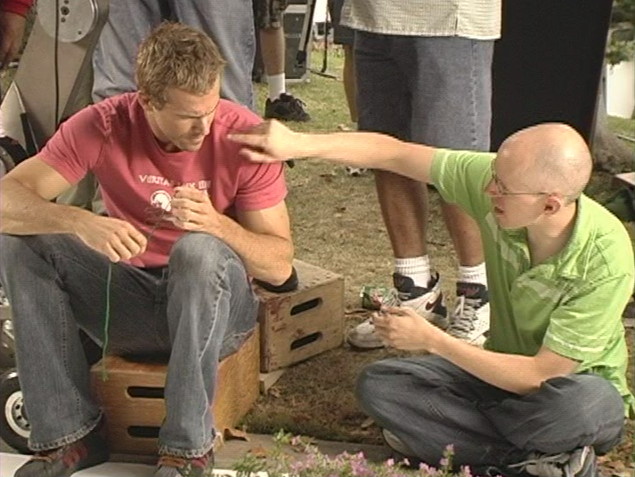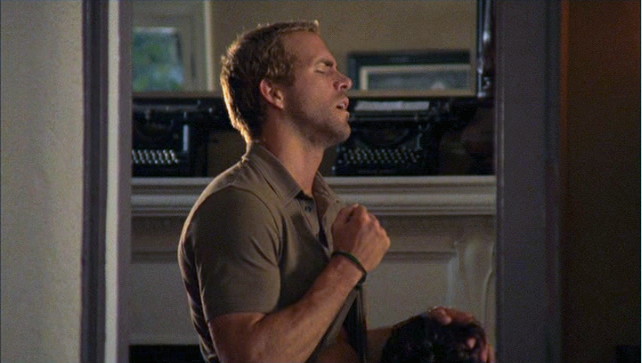Today my article, long in gestation, appears at A List Apart: “Unwebbable” examines how not every document can be folded and mutilated into a “Web page.” (Illustrations.) HTML simply does not provide the right semantics, or even enough semantics, for the many document types that predate the Web. And – much worse – people with half-assed knowledge try to import pre-Web document formats intact to the Web.
People like John August. You may remember him from such films as Go<bang>, Big Fish, and Charlie and the Chocolate Factory, the last of which I watched in London with open captioning. August is an established screenwriter, among other things, and is one of the few of that breed who actually bothers with the Web, a medium he half-understands. It seems to be the wrong half.
As the article describes, August, who runs a WordPress blog, has produced a plug-in for various blog systems, Scrippets, with which “you can add boxes of nicely-formatted script to your blog.” The problem is you cannot graft screenplay format onto the Web, for the reasons I describe.
Not a greenhorn
Now, the standard objection here is that I must be too green in this field to truly understand the deep history and philosophical significance of screenplay formatting. Established screenwriters have many variations of this objection which they foist upon newbies. The problem here is that I understand screenplay formatting quite well. I’ve done my homework.
As the article explains, screenplays are a genius example of document design. They are superb at their intended function – to impart the dialogue and directions of a movie in strict relation to the movie’s runtime. (One page more or less equals one minute of screen time.)
Typography is atrocious, and on this I give no quarter. The reason we use monospaced fonts – that just means Courier – this late into the 21st century is because scripts from the old studio era were written on typewriters. (What else could they have used?) Monospaced fonts are a skiamorph (or skeumorph, if you prefer a narrower transliteration); their use reflects nothing but unconsidered habit.
Typewriter fonts merely give the illusion that a checklist of screenplay-format requirements has been met. You could do exactly the same thing with proportional fonts, except it would be easier to cheat (busting the one-page-a-minute rule) and get away with it. Monospaced fonts are a kind of quality-control system that keeps honest writers honest.
But there’s no reason to use Courier. Outline-font versions of Courier are atrocious and are at best a pale shadow of what is actually a superb typeface when viewed on an IBM Selectric. (Elite works better than pica.) Selectric Courier is a letterpress face, all of which digitize poorly. We are still living with a pre-1980 design decision, taken at Adobe, to digitize Courier as a stroked font, in which all strokes are actually the same stroke of identical width that runs around corners, like making a typeface out of a coat hanger. There absolutely is not an adequate digitization of Courier in existence, including the one you use, which, as of today, you should cease to use.
In the intervening decades we have spent quite a lot of time designing vastly superior monospaced fonts. The nicest thing you the screenwriter can do for your readers is to switch to a real monospaced font. Consolas, or any other variant of TheSans Mono, is a great place to start. So is Fedra Mono. You can and must safely ignore complaints that your script has the “wrong” formatting. It will surely have exactly the right formatting; you’re just using a better font. (This would be a fruitful master’s project for a type-design student at, say, Reading.)
To reiterate, the standard objection holds that I couldn’t possibly know what I’m talking about because everybody who launches any criticism of screenplay formatting must be new around here. I am not new and I do know what I’m talking about.
The same cannot really be said for August’s use of the Web.
Dangerously incomplete knowledge
John August he knows dangerously little about Web standards. In short, Scrippets has lousy semantics and is trying to solve the wrong problem – making a Web page look like a printed screenplay.
I tried to explain this to August back in September 2008 – in, I assure you, a constructive and helpful way. He top-posted back three messages (even after multiple requests not to top-post, two telling indicators in one) stating the following:
-
I respect that you have strong opinions. But you throw grenades and run away. You seem to have no understanding of what screenplay format looks like, and no appreciation for the fact that 70%+ of readers are going to be seeing these examples in feed readers, where custom CSS is impossible, and an
H2could become anything. -
Semantically, you’re saying that
H2is a character name, unless it isn’t.Pis dialogue, unless it isn’t. You’ve saved some characters. But it will mean less in a feed reader than it would have otherwise, because you have absolutely no control over what a feed reader is going to do with thatH2.
August made two requests for “a good-looking example of [my] proposal,” which indicates his thorough misunderstanding of Web standards. (Recap: Content gets marked up, then styled.)
This went on for a while, until the very busy and obviously quite important screenwriter just gave up:
I encourage you to blog about your frustration with my approach. But I’m not spending any more time on this discussion.
Be careful what you wish for. I didn’t just “blog about” it. I wrote an article for the leading magazine for Web developers. The article is the result of months of consideration; what screenplays and literature in general need is XML, not HTML. And now, in under 48 hours, every qualified developer in the world will have quite an accurate idea of just how lousy August’s development skills are. And I don’t mean “development” in the studio sense.
This will change nothing. The man whose “geekery is almost limitless” lives and dies by tag soup. His successful Kindle E-book is marked up that way, quite proudly, it seems. But the issue here is: Why is John August popular online? Well, he bothers to show up, first of all. He dispenses helpful nuggets of advice to neophyte screenwriters, who love him and his site because they hope if they hang around long enough some of his success will rub off on them.
These acolytes are, by definition, worse screenwriters and are probably worse Web developers. They don’t have to be developers – but neither did August, who set out to do it anyway, fails in important respects, and ignores helpful expert advice of the exact sort he dispenses in his field.
So his newbie-screenwriter acolytes will rally around his cause, assuming that because he knows what he’s doing when writing movies he must also know what he’s doing when coding for the Web. He doesn’t.
But I do owe him one thing
I confess I didn’t particularly like any movie I’ve seen that August wrote. (Loved the “Macarena” scene in Go, though.) This is not necessarily uncommon and is neither here nor there. I am, however, one of the few who has seen his directorial début, The Nines, a science-fiction movie that is carefully not billed as such. It stars the winsome, affable, witty Ryan Reynolds, who I think is just smashing.
He and John August are good friends. They travelled to Malawi together. Reynolds stayed at August’s house during the shoot of The Nines, which pretty much took place at August’s house. Ryan Reynolds essentially plays John August in a third of the movie.

A marvellous friendship? Perhaps. But August, “gay-married” and a parent, is in his mid-40s and does not quite share Reynolds’s looks: The actor is tall, handsome, and so nicely built he’s been on the cover of fitness magazines. But really, if Reynolds were as ugly as other B-tier actors like Adrian Grenier, would August still be his friend? (Or ever have become one?) When the Advocate hinted at something along those lines, August’s response was “Ryan is straight; I’m spoken for. The innuendo is harmless, but a little tired.”
Innuendo aside, would gay-married John August still be Ryan Reynolds’ friend if Reynolds weren’t such a fine specimen?
This was the straw that broke the camel’s back. The August–Reynolds friendship was what prompted me to embark on a complex, long-ruminated-on book project, a solicited proposal for which is now being considered by a reputable house. Quite possibly to be available on the Kindle, with perfect code.
DVD extra
Here’s Ryan Reynolds’s character getting a blowjob from a deliveryboy character in The Nines.

So thanks for all that, John. But now everybody knows your code sucks.